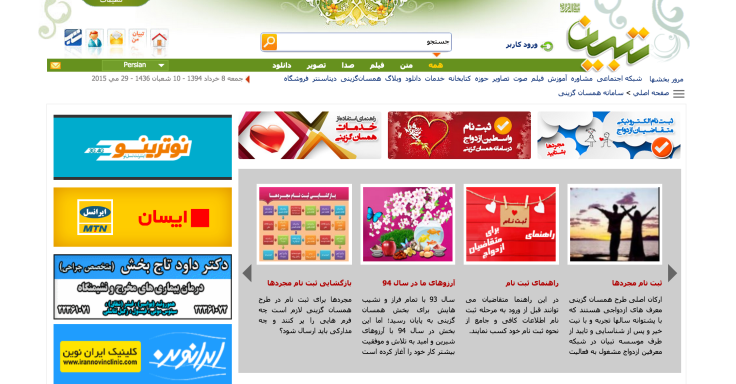Iran's State-Run Dating Website Gains Momentum In Tehran

The Iranian government may ban many Western dating websites, but it's now getting into the game itself, with a dating site actually sanctioned by the state and the country's religious leaders.
The government decided to launch the website, Hamsan.tebyan.net, in the hope of reducing the high rate of divorce among young people in the country. Close to 22 percent of marriages among Iranians end in divorce, according to data cited in a report by the BBC, and the majority of divorces involve couples under the age of 30.
Mahmoud Golrazi, the deputy minister for Sports and Youth Affairs, said he hoped the site would help create "100,000 marriages" and "solve the problem of marriage among young people." The point of the website is to not only reduce the divorce rate but also provide a space for young Iranians from conservative backgrounds to find a match via a modern, progressive technique while adhering to traditional religious standards.
The launch of the state-run website is an unusual move for Iran, where the Internet is censored. All major international social media tools such as Facebook, YouTube, Twitter and Flickr are blocked (yet accessible for people who have a virtual private network, or VPN, a common method of circumventing Internet censorship).
When he came into office in August 2013, reformist President Hassan Rouhani said he understood that expanding access to Internet would help the country's economy, which was hit hard by sanctions imposed by the U.S. and the European Union.
But the president's promises have been stifled by more conservative religious figures in the country, like Supreme Leader Ali Khamenei, who in 2012 issued a decree establishing the Supreme Council on Cyberspace (SCC) to provide a centralized focal point for policymaking and regulation of Iran’s Internet, effectively removing such authority from the executive, legislative and judiciary branches of the government and bringing it under Khamenei’s direct control, according to a report published by Freedom House.
And despite Rouhani's reformist credentials, leading human-rights advocates say there has been a clear increase in the number of activists arrested, detained and tortured because of their activity on social media, particularly on Facebook, since he took office.
Still, the launch of the dating website is a step by Rouhani to enhance Internet freedom in the country. It is not clear how many people have signed up for the website, which is only operational in Tehran, but people from within the country are posting images from the site on social media, praising the government's initiative.
Although launching the website is a major step for the Iranian government, users cannot see others' profiles or pictures. The site's 100 administrators are the only ones with full access to it, and they are the ones responsible for matching users based on a list of basic details such as height and weight, as well as both parents' occupation. Questions about hobbies and tastes in music and food do not appear on the website, the BBC reported.
The site also posts articles about finding love in Iran, as well as the dangers of premarital relations.
The dating service may not gain immediate traction given that there are other sites that work like their Western counterparts, allowing people to get in touch without the intervention of a site administrator, and that most Iranians use virtual private network clients to surf the web. The VPN clients give Iranians the ability to access censored websites by configuring their computers in a way that looks as though they are operating from a different country, such as the U.S.
© Copyright IBTimes 2025. All rights reserved.





















